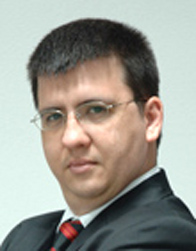Tuncer Baykas, IEEE Standards Coordinator in Region 8
Title: Training on Research Exploitation and Presentation at IEEE standardization meetings
 Bio: Tuncer Baykas received the Ph.D. degree in electrical engineering from the University of Ottawa, in 2007. He joined the National Institute of Information and Communications Technology, Japan, in 2007. During his tenure, he contributed to multiple standardization projects, including 802.15.3c, 802.11ad, and 1900.7. He served as the Chair for IEEE 802.19.1 coexistence in TVWS Task Group. In 2021, he joined Kadir Has University. He is currently IEEE Standards Coordinator in Region 8, the Vice Chair of 802.19 Working Group and 802.11bb Light Communications Task Group. He has over 50 major journal and conference publications, and three U.S. and 37 Japanese patents. His research interests include THz communications, spectrum sharing, and radar signal processing. He was one of the recipients of Turkish Academy of Sciences Young Researcher Award, IEEE-SA Standards Board Award, and IEEE-SA Certificate of Appreciation. He served as a Guest Editor for IEEE Communications Magazine and a Board Member for IEEE ComSoc MMTC E-LETTERS.
Bio: Tuncer Baykas received the Ph.D. degree in electrical engineering from the University of Ottawa, in 2007. He joined the National Institute of Information and Communications Technology, Japan, in 2007. During his tenure, he contributed to multiple standardization projects, including 802.15.3c, 802.11ad, and 1900.7. He served as the Chair for IEEE 802.19.1 coexistence in TVWS Task Group. In 2021, he joined Kadir Has University. He is currently IEEE Standards Coordinator in Region 8, the Vice Chair of 802.19 Working Group and 802.11bb Light Communications Task Group. He has over 50 major journal and conference publications, and three U.S. and 37 Japanese patents. His research interests include THz communications, spectrum sharing, and radar signal processing. He was one of the recipients of Turkish Academy of Sciences Young Researcher Award, IEEE-SA Standards Board Award, and IEEE-SA Certificate of Appreciation. He served as a Guest Editor for IEEE Communications Magazine and a Board Member for IEEE ComSoc MMTC E-LETTERS.
Evgeny Khorov, Institute for Information Transmission Problems of the Russian Academy of Sciences
Title: A very brief introduction to Wi-Fi 7
Abstract: According to the Cisco Visual Networking Index, Wi-Fi is the most popular Internet access technology, which serves over half of global traffic. While customers rivet their eyes on Wi-Fi 6, in the bowels of the IEEE 802.11 Working Group that creates Wi-Fi standards, the new IEEE 802.11be standard for Wi-Fi 7 is being developed. At very first sight, it is nothing but scaled 11ax with doubled bandwidth and the increased number of spatial streams, which together provide data rates as high as 40 Gbps. A deeper dive into the 802.11 activities reveals that 11be will support real-time applications. In reality, 11be introduces many more revolutionary changes to Wi-Fi, which will form a basement for further Wi-Fi evolution. Although the development process is at the very early phase with an unapproved draft, the analysis of the discussion in the 802.11 Working Group gives insights into the main innovations of 11be. In addition to the ones above, they include native multi-link operation, channel sounding optimization that opens the door for massive MIMO, advanced PHY and MAC techniques. In the tutorial, we will analyze the main features, focusing on the open issues that can be solved by the researchers who want to contribute to the development of 802.11be.
 Bio: Evgeny Khorov is currently the Head of the Wireless Networks Lab and the Deputy Director of the Institute for Information Transmission Problems of the Russian Academy of Sciences. He has led dozens of national and international projects sponsored by academic funds and industry. Being a voting member of IEEE 802.11, he has contributed to 802.11 standards with many proposals. He has authored over 150 articles on 5G and beyond wireless systems, next-generation Wi-Fi, protocol design, and QoS-aware cross-layer optimization. He received the Russian Government Award in Science and Technology, several Best Papers Awards, and the Scopus Award Russia 2018. Many times Huawei awarded him as the Best Cooperation Project Leader. He gives tutorials and participates in panels at large IEEE events. He has chaired TPC of the IEEE GLOBECOM 2018 CA5GS Workshop, IEEE BLACKSEACOM 2019, and the Internet Architecture Board Workshop on Network Quality 2021. He was awarded as the Editor of the Year 2020 of Ad Hoc Networks.
Bio: Evgeny Khorov is currently the Head of the Wireless Networks Lab and the Deputy Director of the Institute for Information Transmission Problems of the Russian Academy of Sciences. He has led dozens of national and international projects sponsored by academic funds and industry. Being a voting member of IEEE 802.11, he has contributed to 802.11 standards with many proposals. He has authored over 150 articles on 5G and beyond wireless systems, next-generation Wi-Fi, protocol design, and QoS-aware cross-layer optimization. He received the Russian Government Award in Science and Technology, several Best Papers Awards, and the Scopus Award Russia 2018. Many times Huawei awarded him as the Best Cooperation Project Leader. He gives tutorials and participates in panels at large IEEE events. He has chaired TPC of the IEEE GLOBECOM 2018 CA5GS Workshop, IEEE BLACKSEACOM 2019, and the Internet Architecture Board Workshop on Network Quality 2021. He was awarded as the Editor of the Year 2020 of Ad Hoc Networks.


